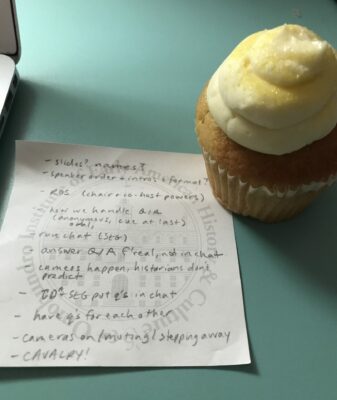
“Welcome to your greenroom.” Six continents’ worth of participants and thousands of registrants joined us for our year-long #USIH2020 virtual conference on “Revolution & Reform.” We hosted new scholarship, in-depth teaching workshops, press-sponsored roundtables, longform interviews with authors, Twitter events, and primary source guides. We featured Native intellectual history, new methodologies in using material culture and Reacting to the Past in the classroom, and examined the many facets of prison pedagogy, Traditional Ecological Knowledge, and the centennial of women’s suffrage. Thanks to the incredibly hard work of the Program Committee, the Local Arrangements Committee, and the Society’s innovative leadership (Huzzah, Tim Lacy and Co.!), we transformed all of the administrative and financial aspects of our usual onsite gathering for the virtual realm, even reimagining the Henry F. May Fund as a source of summer research aid for graduate students that will springboard them into future presentations. Several times a week from September 2020 to April 2021, I had the privilege of welcoming a new round of scholars into our Zoom greenroom, run of show (and dessert du jour) in hand. Here’s what I learned from my year in the executive producer’s seat.
- Conference=community. The chance to collaborate and exchange scholarly finds felt especially precious during a pandemic era of being within, and being without. I had the rare opportunity to go to every session. I enjoyed seeing a lively buzz of cross-pollination: early Americanists dipping into 20th-century neoliberalism studies, high school teachers joining the Society’s ranks as presenters and participants, public historians and curators popping up in the Q/A chat alongside professors and first-time instructors. Aside from grad school reunions and networking opportunities, conferences are a connective force that refuel an organization like ours. Let’s keep it going!
- Conference=dialogue. Sure, we encouraged you to “sit back, relax, and enjoy the scholarship.” But a good conference, virtual or otherwise, is built in conversations that flow into the hall. That extends to the administrative details. As we developed the meeting’s overall structure, we framed every step forward as a joint endeavor: Do you want to publish a paper at the blog or present? Do you want to record or not? How do the chairs and panelists envision the format? Thinking together about those public-facing decisions meant that we could hustle to meet new administrative needs like a Code of Professional Conduct and a program that balanced print and A/V content. At the same time, panelists spent far more time chatting in the run-up to their presentations, which is always a plus.
- Conference=context. If you had a hazy idea of what intellectual history is/was, hopefully this year’s USIH programming showed you what it can be. A quick sweep of our video library shows just how dynamic the field truly is right now. Hats off to all who enthusiastically supported us as sponsors, collaborators, and colleagues!
So where can we travel next? Well, we’d love to see you this fall in Nashville (CFP due 5/28, details here, apply now!). Inspired by my #USIH2020 conference experience, I am delighted to say that I am piloting a new position here for the next year, serving as the Society’s first Program Chair. In this role, I will focus on public programs, education, and community engagement. We will conduct several programs and/or outreach initiatives, either onsite or virtually, throughout the academic year that amplify and communicate the vision, values, and scholarly opportunities of the Society. When possible, we will partner with diverse groups in unique, creative, and enduring ways. Plus, we’ll be thinking about how to tag and organize all of the amazing scholarship that you generously shared with the USIH community during this year’s meeting. Want to get involved? Drop us a line: usih2020@gmail.com. Ideas welcome!

0